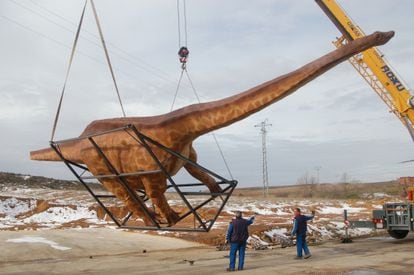Quarter of Spaniards think the Sun revolves around Earth, survey reveals
But scientific literacy is improving, according to the Social Perception of Science report

Thirty percent of Spaniards think that humans once lived alongside the dinosaurs, like in The Flintstones, while 25 percent think the Sun revolves around the Earth, rather than the other way around.
The figures may be horrifying, but they are nevertheless an improvement: in 2006, the proportions were almost 50 and 40 percent, respectively.
The new Social Perception of Science Survey is keen to highlight that Spaniards’ scientific literacy has increased over the last nine years, with the number of correct answers rising from an average 58 percent to 70 percent.
Some 11.5 percent of those surveyed refute that humans are descended from animals
Nevertheless, barely 46 percent of people in Spain know that antibiotics cannot cure diseases caused by viruses, only those that originate from bacteria, while 11.5 percent refute that humans are descended from animals – something that could be a result of the times when the Catholic Church banned Spanish television from broadcasting anything related to evolution.
Twenty-seven percent also think that all of the planet’s radioactivity is generated by humans, when in fact 80 percent of radiation to which a person is exposed over the course of their life comes from natural sources, such as cosmic rays and radon gas in the subsoil. Most of the remaining 20 percent is the result of medical tests, such as X-rays, with only 0.01 percent deriving from nuclear plants, according to the United Nations Scientific Committee on the Effects on Atomic Radiation.
This lack of basic scientific knowledge could explain why 54 percent of those surveyed directly reject nuclear energy. The survey, which was carried out by the Spanish Foundation for Science and Technology (Fecyt), also notes that 42 percent of Spaniards are against the cultivation of genetically modified plants.
Around 27 percent consider homeopathy “very or fairly scientific,” while 14 percent defend astrology
At the same time fracking – the controversial technique to extract natural gas from deep underground using a cocktail of chemicals – is rejected by 24 percent of people, compared with 17 percent who see it as a good thing. Almost 43 percent, however, still do not know what fracking is.
But there are some positive results, says Fecyt, which comes under the wing of the Economy Ministry. The image of science among Spaniards has improved 12 percent in the last two years. However, it seems that what exactly science is is not altogether clear to everyone. Around 27 percent consider homeopathy as “very or fairly scientific,” rather than a pseudoscience that lacks any scientific proof of its effectiveness. Fourteen percent defend astrology.
Presenting the survey, state secretary for research and development Carmen Vela lamented that there were two major gaps in the population: one generational and one gender-based.
Young people between the ages of 15 and 24 tend to be those most interested in science – in the 45 to 54 age group the proportion of those interested does not even reach 12 percent.
Young people between the ages of 15 and 24 tend to be those most interested in science
At the same time, interest in science is double that in men (20 percent) than women (10 percent) – a difference visible across all age groups, including among the youngest segment.
“This discrepancy may be a result of the low visibility of women scientists, even at award ceremonies – the proportion of women who win prizes is not even five percent, they are practically absent,” Vela said.
The survey shows that people are also demanding more scientific information from the media. Around 60 percent of those consulted say the number of science stories is “insufficient” in print, on radio and on TV. Only digital media meet the demand for scientific information, the survey finds.











































